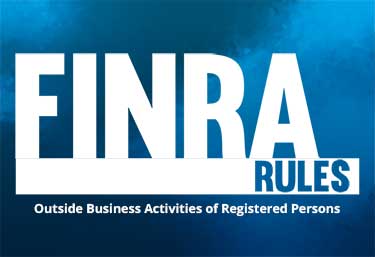Understanding Finra 3270

Due to the very nature of the relationship, all investors are forced to put a tremendous amount of faith in the hands of their registered investment advisor (RIA).
You rely on your financial advisor for high quality, impartial guidance. Under industry standards, your RIA has a legal obligation to always put your best financial interests above their own personal or professional interests.
To ensure that this happens, the Financial Industry Regulatory Authority (FINRA) has enacted rules that require RIAs to disclose all of their professional conduct and business activities.
Specifically, FINRA Rule 3270 prohibits registered persons from engaging in any business activities, outside the scope of their relationship with their member firm, unless they have provided adequate prior written notice to their member firm.
Rule 3270 is extremely important, as it helps to ensure that investors will have access to full information regarding their RIA’s professional conduct, including any potential conflicts of interest. With this information in hand, investors can make informed choices. Here, our experienced FINRA arbitration attorneys discuss some of the key elements of this rule.
FINRA Rule 3270 Topics Covered Here
What is an Outside Business Activity (OBA)?
First and foremost, investors must have an understanding of what type of conduct actually qualifies as an ‘outside business activity’ under financial industry regulations. FINRA Rule 3270 defines outside business activities very broadly. Indeed, within the text of the rule, the following types of professional conduct are explicitly defined as OBAs:
- Working as an employee at any other company;
- Working as an independent contractor or sole proprietor, in any capacity;
- Serving as an officer, director or partner on any board;
- Receiving compensation, in any form, for business conduct; or
- Having the reasonable expectation of receiving compensation for their role at some point in the future.
To be clear, under Rule 3270, compensation is not necessarily required for something to count as an outside business activity. For example, if a registered investment advisor serves as a director on a corporate board, they must report that role to their member, even if they are not actually getting paid for their contribution.
The Exceptions: Passive Investments and Private Securities Transactions
While Rule 3270 applies broadly, passive investments and private securities transactions are exempted from coverage. Passive investments might include something like your advisor putting their own money into a well diversified index fund or them putting their assets into a blind trust. They would have no influence over those specific investments, and thus, they may not need to be disclosed.
Private securities transactions are also exempted from coverage under this rule. The reason for this is because these transactions are instead covered by FINRA Rule 3280. When engaging in any private securities transactions, your financial advisor has a legal duty to comply with the strict disclosure requirements of Rule 3280.
Beyond Disclosure: Brokerage Firms Must Protect Their Clients
The only professional duty that financial advisors have under Rule 3270 is to make disclosures. From there, it is up to the brokerage firm to protect the all of their customers.
Indeed, upon receiving official written notice that a registered investment advisor wishes to engage in outside business activities, a member firm must then conduct an immediate, in-depth review of the totality of the circumcises surrounding the request. More specifically, this review must center on the following two critically important questions:
- Will the proposed outside business activities in any way interfere with or compromise the RIA’s ability to effectively serve the firm’s customers?
- Will the outside business activities be viewed by the firm’s customers as part of the firm’s overall business?
Based on their review of the request, the brokerage firm must then decide how to handle the issues. If they deem that doing so is appropriate, the brokerage firm can impose conditions or limitations on the proposed outside business activities. Further, when appropriate, the brokerage firm can (and should) prohibit the proposed activity entirely. Additionally, broker-dealers have a legal duty to keep detailed records of all OBA-related requests and their compliance review.
Ultimately, it is up to brokerage firms to protect the rights and interests of their customers. Brokerage firms must be able to ensure that the RIAs are not in any way compromising their clients’ best interests through outside business activities. If they fail to do so, firms can be held legally liable for investor losses.
Were You a Victim of Investment Fraud?
We can help. At Sonn Law Group, our dedicated securities fraud attorneys have extensive experience representing investors during FINRA arbitration proceedings. To set up an immediate, free review of your claim, please call our office today at 844-689-5754 or reach out to us directly through our website.
CONTACT US FOR A FREE CONSULTATION
Se Habla Español
Contact our office today to discuss your case. You can reach us by phone at 844-689-5754 or via e-mail. To send us an e-mail, simply complete and submit the online form below.

